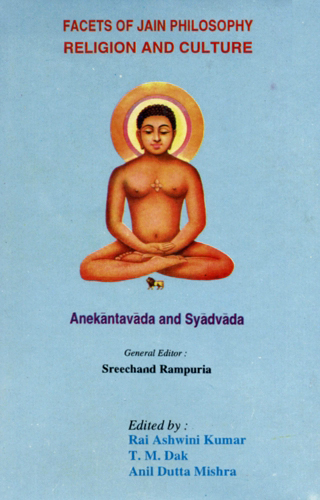There are, as shown, seven significant predicates or modes of truth (bhaṅgāḥ) and as each mode - though obtained by an analysis of any simple cognition or judgment and established by reflective thought - is prima facie subject to doubt because of its dialectical nature, there can be seven kinds of doubts (saṁśayāḥ) about them. The seven doubts give rise to seven forms of curiosity (jijñāsāḥ), which, in their turn, give rise to seven questions (praśnāḥ). The seven questions require seven answers (uttarāṇi), and the seven propositions, therefore, are asserted to meet the requirement.[1]
The accredited forms of the seven propositions - e.g., syādastyeva ghaṭaḥ and the like - have been given while discussing the import of the predicates and hence need no repetition. Their individual significance has also been discussed. The only important problem, therefore, that remains to be examined, is the significance of the seven propositions in general and their interrelation.
A proposition is a sentence which expresses what is either true or false[2], and what is expressed is its significance. True and false propositions are equally significant: if true, they express facts; if false, they fail to do so. The seven propositions are significant because expressive, and true because what they express are, on reflection, found to be facts. They are also not mere truisms, because they express truths which are not ordinarily recognized as such. These truths again are necessary, universal and constructive necessary because neither experience nor logic contradicts them; universal because they are true of all reals; constructive because they give a synthetic view of reality. The propositions are also interrelated, and make a system. Existence and non-existence are mutually concomitant and they together qualify the same object.[3] All the seven propositions follow logically from this dictum. In fact, the very first proposition, when logically unfolded, leads to the other six as a matter of necessity. Each proposition taken singly is also significant in that it "constitutes", in the words of Professor Mookerjee, "an estimation of reality, which has been either advocated by a school of philosophers as a matter of historical fact or is capable of being entertained as a possible evaluation."[4] But an isolated proposition, according to the Jaina philosopher, does not give the whole truth. It may, on the contrary, give an untruth, if taken as negation of other truths; and it can at best, provided it only asserts itself without negating others, give a partial truth, that is, naya which is described as neither truth nor untruth.[5] The Jaina philosopher, therefore, rejects the validity of the isolated propositions because they stand for extremisms, and knits them together into a system which is known as non-extremism or non-absolutism (anekāntavāda).
भंगाः सत्त्वादयः सप्त संशयाः सप्त तद्गताः। जिज्ञासाः सप्त सप्त स्युः प्रश्नः सप्तोत्तराण्यपि।� Quoted in SBT, p. 8; see TV, iv. 42 (15) and TSV p. 132 where all the five heptads of भंग? (अस्तित्व, नास्तितव etc.) विप्रतिपत्ति (संशय), जिज्ञासा, प्रश्न and वचन (उत्तर) are given.
Cf. Aristotle: "'Every sentence has meaning' not as being natural means by which a physical fault is realised, but, as we have said, by convention. Yet every sentence is not a proposition; only such are proposition as have in the either truth or falsity. Thus a prayer is a sentence, but is neither true nor false." - De Interpretation, 17a.
अस्तित्वं प्रतिबर्ध्यंनाऽविनाभाव्येकधर्मिणि।
विशेषणत्वात् साधर्म्यं यथा भेदविवक्षया॥
नास्तित्वं प्रतिपेर्ध्यंनाऽविनाभाव्येकधर्मिनि।
विशेषणत्वाद् वैधर्म्यं यथाभेद विवक्षया॥ AM, 17-8.
Thus every part is full of vice,Appearance and Reality, P. 510.
yet the whole mass a paradise." -
 Dr. Nathmal Tatia
Dr. Nathmal Tatia

